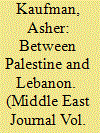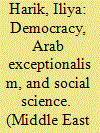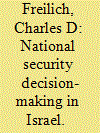| Srl | Item |
| 1 |
ID:
074753


|
|
|
|
|
| Publication |
2006.
|
| Summary/Abstract |
This article follows the fate of the only seven Shi'i villages in Mandatory Palestine, beginning in the time of the border demarcation between Palestine and Lebanon (1919-1924) and concluding with Hizbullah's demand to retrieve their territories back to Lebanon (2000). The article examines the relations of the villages with the Jewish Yishuv and with the Sunni population in Palestine during the British Mandate; their fate as Palestinian refugees in Lebanon; and their status in Lebanon after the 1994 naturalization law that granted them Lebanese citizenship. The story of the seven villages is examined through three prisms: that of the villages themselves, of the Palestinians, and of the Lebanese. The different narratives enlighten themes such as the colonial legacy in the Middle East, border dynamics, identity formation, and internal Lebanese politics.
|
|
|
|
|
|
|
|
|
|
|
|
|
|
|
|
| 2 |
ID:
074752


|
|
|
|
|
| Publication |
2006.
|
| Summary/Abstract |
This article deals with a cross-national measurement methodology of democracy as it is applied to Muslim and Arab nations by Freedom House, a major research organization. The results of Freedom House's studies show that Muslim and Arab states prove comparatively to be exceptional in being resistant to democracy. This article briefly examines measurement criteria then highlights the finding that the exceptionalism thesis propagated by the Freedom House project is the product of serious discrepancies in the measurement application.
|
|
|
|
|
|
|
|
|
|
|
|
|
|
|
|
| 3 |
ID:
074751


|
|
|
|
|
| Publication |
2006.
|
| Summary/Abstract |
This article presents a first of its kind typology of Israeli national security decision-making processes, focusing on five primary pathologies and a number of strengths. It will demonstrate that these pathologies are the product of an extraordinarily compelling external environment and domestic structural factors: chiefly, the extreme politicization of the decision-making process stemming from the proportional representation electoral system, the consequent need to govern through coalition cabinets, and the absence of effective cabinet-level decision-making support capabilities.
|
|
|
|
|
|
|
|
|
|
|
|
|
|
|
|
| 4 |
ID:
074755


|
|
|
|
|
| Publication |
2006.
|
| Summary/Abstract |
There are two factors that have shaped Qatar's integration and place in the international system. The first revolves around the constraints and problems of small states while the second is Qatar's response - a strategy of branding the state for survival. This article discusses Qatar's situation as a micro-state and analyzes the nature and success of its response.
|
|
|
|
|
|
|
|
|
|
|
|
|
|
|
|
| 5 |
ID:
074754


|
|
|
|
|
| Publication |
2006.
|
| Summary/Abstract |
What type of political order do Egypt's Islamists seek to create? This question is examined by studying two types of sources: the theoretical works of Egypt's most prominent contemporary Islamic thinkers and the documents issued by the Muslim Brotherhood during its 2005 parliamentary campaign. These sources indicate that a distinctively Islamic conception of constitutionalism has emerged that legitimates many of the key goals of liberal governance, including constraints on state power, governmental accountability, and protection of some civil and political rights. However, the institutions of Islamic constitutionalism support a conception of political order that differs from liberalism in important respects. These differences are most apparent with regard to the purpose of the state, the role of the individual in politics, and the function of law.
|
|
|
|
|
|
|
|
|
|
|
|
|
|
|
|